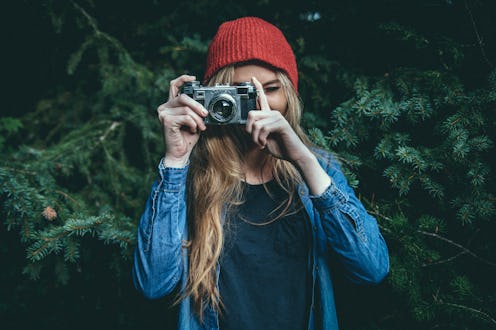Life
Ways To Get Your Creative Energy Flowing

I'm a writer, which means sometimes I can't think of a single thing to write about. It's why knowing helpful ways to overcome a creative block is unbelievably useful in my line of work.
But you definitely don't have to be a writer or in a "creative" profession to feel stumped creatively. In a Psychology Today piece on the art of creativity, Brandeis University professor Teresa Amabile noted that, "We've become narrow in the way we think about creativity. We tend to think of it as rarefied: artists, musicians, poets. But the cook in her kitchen is showing creativity when she invents a variation on a recipe."
Basically, you could be planning a party, decorating a room, or just trying to figure out the best way to give a presentation at work — a ton of things in daily life require creative energy and it can feel so incredibly frustrating when we can't find inspiration when we need it.
If you’re in the midst of planning something important to you — like a birthday party or a major event at work — or are just working small scale, like trying to rearrange the look of a room you’re not loving in your home, here are seven hacks to help beat any creative block.
1. Don't Think About It
On his writing blog, professional author Jeff Goins recommended simply walking away from the problem for a while. "Leave your desk. Get away for awhile and do something wild like draw with crayons or play with LEGOS. Watch The Matrix," Goins said. Often times thinking about something too much is the reason we're having trouble getting true perspective on it.
2. Embrace Solitude
Leo Babauta, founder of the site Tiny Buddha, said solitude is a necessity for creative thinking. "The best art is created in solitude," Babauta said. "It’s only when we are alone that we can reach into ourselves and find truth, beauty, soul. Some of the most famous philosophers took daily walks, and it was on these walks that they found their deepest thoughts." And while most of us may not be trying to create "truth" or "soulful beauty," the advice is still super applicable — being alone creates the time and mental space for our thoughts to flow freely without interruption.
3. Turn Off Your Phone
OK, this is a personal tip, and it majorly leap frogs off of Babauta's point on embracing solitude. There is nothing like being in a free-floating creative space, or right on the brink of an awesome idea, when you get a text from a friend telling you her favorite barbecue restaurant is closed. And because constant-communication is so tempting, odds are you'll leave your creative mental space to text back. I have started leaving my phone at home on walks and leaving it on silent when I'm home working; that way I can check it whenever I want, but am not actively receiving interruptions from the outside world.
4. Take Notes
In his piece, Babauta also spoke to many creative professionals to get their advice for beating their blocks, and one of the top tips was simply writing ideas down as they come. Author and designer Ali Edwards recommended simply taking notes as you brainstorm. "I am a really good note-taker," she said. "It’s essential for me to write down my ideas when they come to mind…otherwise, poof, they disappear way too quickly as I move on to the next task (diaper changes, wiping noses, tending to the stuff of life). I use my phone, my computer, and a moleskine notebook to jot down thoughts and ideas."
5. Make Mistakes
According to psychologist Daniel Goleman in the same Psychology Today piece on creativity, research suggests that creative people make more mistakes than others, but it's not because they're naturally careless or less attentive; they're just more willing to try different things that might not work. "They spin out more ideas, come up with more possibilities, generate more schemes. They win some; they lose some," Goleman said. So don't be afraid to mess up. Write down the craziest ideas you have and don't worry about what will and won't "work"; odds are you'll stumble on the best idea this way.
6. Move Your Body
In an article for Mic, founder and CEO of Wordstream recommended just getting up and moving. "Go for a walk. Physically move your body and consider your project problem from different locations. Physical movement has been shown to have a positive effect on creative thinking, just as theater pros suggest practicing lines in different poses and positions to generate new character approaches," he said. So throw on some gym clothes and move around — it will more than likely get you into a better mental space to actually create than sitting at a desk and staring at your computer.
7. Take A Vacation
This is an extreme version of "not thinking about it," and "changing location," but sometimes it can be the best thing for your brain — especially if you're someone like me who has to generate a high volume of creative work on a weekly basis. According to a piece in The Guardian, research has shown that taking trips away from our usual geographic location can make our minds more efficient. The research shows that it's not about the act of relaxing; it's about putting physical distance between ourselves and our normal day-to-day. It makes our usual problems feel smaller and gives us valuable perspective and mental space to think.
Creativity is not a limited-time-only kind of thing. When you're having trouble thinking of good ideas, it's probably just because you're brain is too busy with a million other things and you aren't giving yourself the simple space and tools you need. So grab a notebook and some walking shoes and get creative.